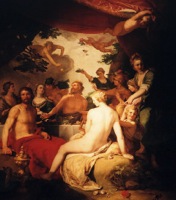Ambrosia
Origin
Latin, from Greek, literally, immortality, from ambrotos immortal, from a- + -mbrotos (akin to brotos mortal)
The concept of an immortality drink is attested in at least two Indo-European areas: Greek and Sanskrit. The Greek ἀμβροσία (ambrosia) is semantically linked to the Sanskrit अमृत (amṛta) as both words denote a drink or food that gods use to achieve immortality. The two words appear to be derived from the same Indo-European form *ṇ-mṛ-to- : immortal (n- : negative prefix from which the prefix a- in both Greek and Sanskrit are derived; mṛ : zero grade of *mer- : to die; and -to- : adjectival suffix). A semantically similar etymology exists for nectar, the beverage of the gods (Greek: νέκταρ, néktar) presumed to be a compound of the PIE roots *nek-, "death", and -*tar, "overcoming".
However, the connection that has derived ambrosia from the Greek prefix a- ("not") and the word brotos ("mortal"), hence the food or drink of the immortals, has been questioned as coincidental by some modern linguists.
Definitions
- 1a : the food of the Greek and Roman gods
- b : the ointment or perfume of the gods
Description
In ancient Greek mythology, ambrosia (Greek: ἀμβροσία) is sometimes the food or drink of the Greek gods (or demigods), often depicted as conferring ageless immortality upon whomever consumed it. It was brought to the gods in Olympus by doves, so it may have been thought of in the Homeric tradition as a kind of divine exhalation of the Earth.
Ambrosia is sometimes depicted in ancient art as distributed by a nymph labeled with that name. In the myth of Lycurgus, an opponent to the wine god Dionysus, violence committed against Ambrosia turns her into a grapevine.[1]
Quote
The " tree of the knowledge of good and evil " may be a figure of speech, a symbolic designation covering a multitude of human experiences, but the "tree of life" was not a myth; it was real and for a long time was present on Urantia. When the Most Highs of Edentia approved the commission of Caligastia as Planetary Prince of Urantia and those of the one hundred Jerusem citizens as his administrative staff, they sent to the planet, by the Melchizedeks, a shrub of Edentia, and this plant grew to be the tree of life on Urantia. This form of nonintelligent life is native to the constellation headquarters spheres, being also found on the headquarters worlds of the local and superuniverses as well as on the Havona spheres, but not on the system capitals.
This superplant stored up certain space-energies which were antidotal to the age-producing elements of animal existence. The fruit of the tree of life was like a superchemical storage battery, mysteriously releasing the life-extension force of the universe when eaten. This form of sustenance was wholly useless to the ordinary evolutionary beings on Urantia, but specifically it was serviceable to the one hundred materialized members of Caligastia's staff and to the one hundred modified Andonites who had contributed of theirlife plasm to the Prince's staff, and who, in return, were made possessors of that complement of life which made it possible for them to utilize the fruit of the tree of life for an indefinite extension of their otherwise mortal existence.[2]
